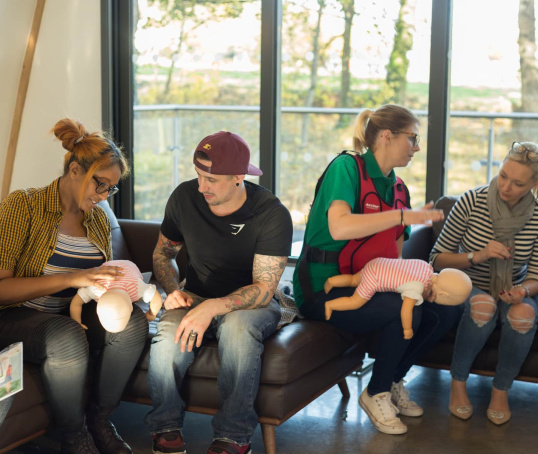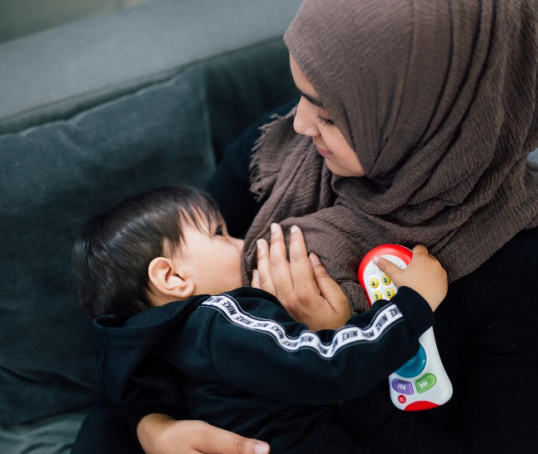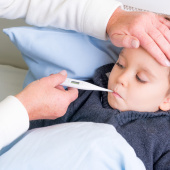Choking is a common worry for parents. Here we share first aid tips you can use if a baby is choking.
One of the ways that babies explore the world around them is by putting things into their mouths. Unfortunately, babies are more likely to choke as they haven’t yet learnt which items are foods, and don’t always chew, swallow and breathe in the right order, which can sometimes lead to choking.
What to do if your baby starts choking
1. Give up to five back blows
Lay them face down along your thigh, with their head lower than their bottom. Support their head and shoulders. Hit them firmly between the shoulder blades with the heel of your hand. If back blows don’t dislodge the object, move on to step two.
2. Give up to five chest thrusts
Turn them over, so they are facing upwards and place two fingers in the middle of their chest, just below the nipples. Push sharply downwards up to five times.
3. Call 999 if the object does not dislodge
Safety tips to prevent choking
When you have a baby, it’s important to be aware of potential choking hazards in and around the home.
- If you give your baby a bottle, always hold the bottle and your baby whilst feeding. It’s not safe to leave babies to feed themselves or to prop up a bottle; if they choke they won’t be able to push the bottle away.
- Babies can choke on something as small as a grape, so don’t leave your baby alone when they’re eating. If your baby is starting to feed themselves, they can have large enough pieces to hold. If you are spoon feeding, cut your baby’s food into small, manageable pieces, depending on their age.
- Be aware of ties and toggles on clothing.
- Keep small things like buttons, coins or small parts from toys out of reach.
- Choose toys that are age appropriate.
Frequently asked questions
How will I be able to tell if my baby is choking?
If a baby or child is choking, they won’t be able to breathe, cry, cough or make any noise at all.
How hard should the back blows be?
You should modify the force of the back blows depending on the size of the baby. You need to be much more gentle with a baby, or smaller child, than you are with a larger child. The force with which you deliver the back blows should also be relative to your own strength. The back blows need to be hard enough to dislodge the object.
Should I try to pull the object out with my fingers?
No, putting your fingers blindly into the mouth to try and remove any foreign object is not recommended. You risk pushing the object further down or actually harming the sensitive soft tissue at the back of the throat, which could swell and cause further damage. However, if you can clearly see an object in a baby's mouth and you are able to pluck it out safely with your fingertips, you could do so.
How will I know for definite when the obstruction has been cleared?
In the vast majority of occasions, you will see it coming out of the mouth and the baby will start to breathe again.
If my baby is choking, should I hang them upside down by their feet?
No, this is not effective and may cause further injury if you happen to drop them. Tipping them upside down may also move the object further down their throat.
What happens if the object goes down into the lung rather than coming out the mouth?
It’s not ideal, but it can be dealt with in hospital. The important thing is that the airway is clear so the baby can breathe again.
Is it a good idea to give a choking baby a drink of water or something to eat?
No, it’s not a good idea as it will not dislodge the object and may make the situation worse by causing a further blockage.
Why do I have to hold my baby with their head lower than their bottom?
With babies, the blockage is often a liquid (milk curds or mucus) so ensuring the head is lower than the bottom helps the liquid to drain out – gravity will lend a helping hand.
Why do I have to support the head?
Supporting the head will enable you to keep your baby’s airway open, helping to dislodge the object.
Can I do abdominal thrusts (the ‘Heimlich manoeuvre’) on a baby?
No, don’t squeeze a baby’s tummy. Chest thrusts can safely be given to a baby, if back blows have not dislodged the object.
What should I do if my baby becomes unresponsive and stops breathing?
Find out how to help your baby (birth to one year) if they are unresponsive and not breathing in our article about CPR.
Last updated June 2016
Further information
Our support line offers practical and emotional support with feeding your baby and general enquiries for parents, members and volunteers: 0300 330 0700.
NCT and Mini First Aid run First Aid courses for parents with babies and children on life-saving topics, such as CPR, stopping bleeding and what to do if your child is choking. Find your nearest course.





